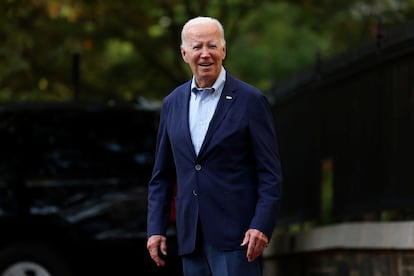Biden will visit Hanoi next month as he seeks to strengthen US-Vietnam relations
‘The leaders will explore opportunities to promote the growth of a technology-focused and innovation-driven Vietnamese economy,’ White House press secretary Karine Jean-Pierre said in a statement

President Joe Biden is heading to Vietnam next month to meet with General Secretary Nguyen Phu Trong and other Vietnamese leaders, the White House announced on Monday. The president will travel to Hanoi on Sept. 10, tacking on the one-day visit to the Vietnamese capital after attending the annual Group of 20 leaders’ summit in India.
“The leaders will explore opportunities to promote the growth of a technology-focused and innovation-driven Vietnamese economy, expand our people-to-people ties through education exchanges and workforce development programs, combat climate change, and increase peace, prosperity, and stability in the region,” White House press secretary Karine Jean-Pierre said in a statement.
The White House also announced on Monday that Biden will stop in Alaska on his way home from Vietnam to mark the 22nd anniversary of the Sept. 11, 2001, attacks on the United States. He will take part in a memorial ceremony at Joint Base Elmendorf-Richardson in Anchorage with members of the military, first responders and their families, Jean-Pierre said.
The announcement about Vietnam comes after weeks of Biden hinting at a possible visit. He said at a July 29 campaign reception in Freeport, Maine, that Vietnam’s leader wanted to meet him. He then told donors at a New Mexico reception earlier this month that he would “be going to Vietnam shortly because Vietnam wants to change our relationship and become a partner.”
“I’ve gotten a call from the head of Vietnam, desperately wants to meet me when I go to the G20,” Biden said at the Freeport reception. “He wants to elevate us to a major partner, along with Russia and China. What do you think that’s about? No, I’m not joking.”
Vietnam is an authoritarian state ruled by a single party, the Communist Party of Vietnam. Human rights groups have raised concerns in the past about the Vietnamese curtailing freedom of expression, association, and peaceful assembly, and the arrests of dozens of critics of the government.
Asked about Vietnam’s rights record, Jean-Pierre told reporters that Biden “never shies away” from bringing up human rights with any leader.
Biden has put a premium on improving and expanding relationships in Southeast Asia throughout his time in office, amid growing U.S. concern about China’s growing military and economic influence in the region.
At the same time, Biden and his aides have repeatedly said they seek to improve communication between the two governments to work on issues on which the Democratic administration says they have common interest — such as global efforts to combat climate change — and avoid unnecessary conflict and misunderstanding.
The United States for years has sought to strengthen relations with Vietnam, which has cautiously approached entreaties by Washington. Both China and Russia have long served as key trading partners for Vietnam.
The Vietnam visit was announced after Biden earlier this month hosted the leaders of Japan and South Korea for a historic summit at the U.S. presidential retreat of Camp David to cement a new economic and security agreement.
Biden has worked to bring South Korea and Japan — historic rivals — closer together amid their shared concerns about Chinese assertiveness in the Pacific and North Korea’s nuclear program.
Sign up for our weekly newsletter to get more English-language news coverage from EL PAÍS USA Edition
Tu suscripción se está usando en otro dispositivo
¿Quieres añadir otro usuario a tu suscripción?
Si continúas leyendo en este dispositivo, no se podrá leer en el otro.
FlechaTu suscripción se está usando en otro dispositivo y solo puedes acceder a EL PAÍS desde un dispositivo a la vez.
Si quieres compartir tu cuenta, cambia tu suscripción a la modalidad Premium, así podrás añadir otro usuario. Cada uno accederá con su propia cuenta de email, lo que os permitirá personalizar vuestra experiencia en EL PAÍS.
¿Tienes una suscripción de empresa? Accede aquí para contratar más cuentas.
En el caso de no saber quién está usando tu cuenta, te recomendamos cambiar tu contraseña aquí.
Si decides continuar compartiendo tu cuenta, este mensaje se mostrará en tu dispositivo y en el de la otra persona que está usando tu cuenta de forma indefinida, afectando a tu experiencia de lectura. Puedes consultar aquí los términos y condiciones de la suscripción digital.








































